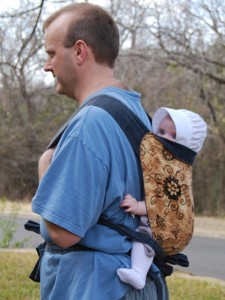Today, API Speaks is proud to feature a guest post by Dr. Lawrence J. Cohen, Ph.D., author of Playful Parenting. Dr. Cohen is a licensed psychologist specializing in children’s play and play therapy. Find out more at PlayfulParenting.com.
Some parents are intuitively attachment-oriented; some seek out an alternative to their childhood; and some stumble onto it. Whichever way they find attachment parenting, it can seem to many parents like the solution to every parenting situation. As the saying goes, give a child a hammer and everything suddenly looks like a nail.
But life isn’t that straightforward, is it? Just about anything in life powerful enough to provide significant solutions is also likely to create some new difficulties along the way. As a child and family therapist, I frequently recommend more attention to attachment in non-AP families.
However, when I work with attachment-oriented parents, they are typically puzzled by the problems they are facing, because they are “doing everything right” in terms of fostering attachment. I explain that they have indeed prevented many common problems, but in the process they have opened themselves up to some new and different challenges that “come with the territory.” This does not undermine the choices they have made. It’s like choosing not to vaccinate against chicken pox; it would be naïve to make that decision and not be prepared for spots, itching, and missed school days.
So what are the “itchy spots” of attachment parenting? The ones I tend to see most frequently involve some or all of these: aggressiveness, defiance, frequent meltdowns, emotional oversensitivity; sensory oversensitivity, and inflexibility. Paradoxically, there are also sometimes problems with separation and insecurity. Often these issues arise rather suddenly, most typically between age 2.5 and 3.5. The parents, meanwhile, are often at the end of their rope, begin to have conflicts over parenting style, and may wonder if they have created a monster.
But these problems are not the result of too much attachment or of not being good enough at attachment parenting. They are simply some of the predictable challenges of this approach.
Fortunately, these issues are generally easier to resolve than the ones caused by not enough attachment. A little playful parenting goes a long way towards bringing things back into balance and harmony.
Children thrive when they have manageable challenges. Insurmountable obstacles make them shut down, but sometimes the commitment to secure attachment can mean that a child does not have enough obstacles to “bump up against.” Part of the problem is that some parents only say “no” when they really really really mean it, or when they have flipped from their usual calm state to their rare–but intense–“losing it” state. The result is that “no” gets filled with tension, and there are no good ways for the child to release that tension. So play with the word no: “Nobody better touch these pillows or else they are in BIG TROUBLE!” Make sure to smile a goofy grin when you say this, and make sure the “trouble” is funny and fun. If a child is using potty talk or obscenities, you can try saying, “Oh, that’s OK to say, but you better not say kumquat.” Again, remember to ham up the silly-fake-mad reaction when they do say the pretend-bad word.
One reason this set of problems often arises around age 2-4, is that kids this age really need something to fight against, so that they can know where they stop and the world starts, and so they can know how strong they are. So roughhousing and playful rough and tumble play are perfect games for them. Wrestle, chase, pillow fight–but keep it light and fun. Go for the giggles, which are the sign of a release of the tension and a return to their sunny (safely secure) selves.
I hope you can see that I am not suggesting “toughening up” or (heaven forbid) letting children cry themselves to sleep. I’m suggesting a playful approach that helps to balance the wonderful strengths of attachment parenting. Try it out and let me know how it works at larry@playfulparenting.com.

